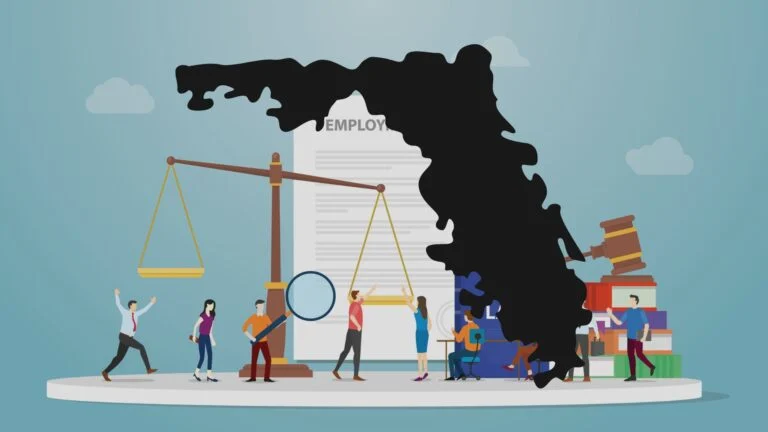Picture a bustling Florida restaurant where Elena, the owner, pores over payroll late at night, ensuring her staff’s wages align with the state’s rising minimum. Meanwhile, her dishwasher, Diego, checks his paystub, unsure if his overtime hours are calculated correctly. Across town, Maya, a new manager, faces a dilemma when an employee requests accommodations. These scenarios reflect the real-world stakes of Florida’s employment laws in 2025/2026. As a certified SHRM-CP HR professional, I’ve crafted this guide to empower employers and employees with clear, actionable insights. Packed with stories, practical tips, and the latest regulations, this post ensures you navigate Florida’s workplace rules with confidence—whether you’re building a compliant business or advocating for your rights.
1. Understanding At-Will Employment
Florida’s at-will employment doctrine allows either party to end a job anytime, for any reason, unless it violates protected rights.
Story: Lucas, a sales associate, is fired by his manager, Olivia, after missing a team meeting, citing at-will status. But Lucas had just reported discriminatory comments from a coworker to HR. When he consults an attorney, Olivia’s company faces a retaliation claim, as the timing suggests his firing wasn’t just about the meeting.
Key Takeaways:
- At-will applies unless a contract (e.g., union or executive agreement) specifies otherwise.
- Illegal terminations include those tied to discrimination, retaliation, or protected activities.
- For Employers: Document performance issues (e.g., tardiness logs) to justify terminations.
- For Employees: Save evidence of workplace complaints to challenge unfair firings.
Action Tip: Employers should use HR tools like BambooHR to track performance, while employees can document incidents via email or notes.
2. Navigating Minimum Wage and Overtime
Florida’s minimum wage, driven by a 2020 voter amendment, is $13.00/hour in 2025, rising to $14.00/hour on September 30, 2025, and $15.00/hour in 2026. Overtime follows the federal Fair Labor Standards Act (FLSA).
Story: Sofia, a bartender, earns $9.98/hour plus tips at a lively beachfront bar. Her manager, Raj, applies a $3.02/hour tip credit to meet the $13.00/hour minimum. During a slow week, Sofia’s tips don’t cover the gap, so Raj adjusts her pay to comply. When Sofia works 48 hours, she earns $19.50/hour (1.5× her rate) for the extra 8 hours, but only after noticing an error on her paystub and raising it with Raj.
Key Takeaways:
- Minimum Wage: $13.00/hour now, $14.00/hour by September 2025.
- Tipped Workers: Direct wages of $9.98/hour; total pay must meet $13.00/hour.
- Overtime: Non-exempt workers get 1.5× pay for hours over 40/week.
- Exempt Threshold: $58,656/year ($1,128/week) for exempt employees as of January 1, 2025.
- For Employers: Update payroll systems and audit exempt roles to avoid FLSA fines.
- For Employees: Check paystubs weekly to ensure accurate wages and overtime.
Action Tip: Employers can use payroll software like Gusto for compliance, while employees should track hours with apps like Toggl. Explore Florida wage laws.
3. Teen Workers Under HB 49
House Bill 49 (effective July 1, 2024) removed mandatory meal and rest breaks for 16- and 17-year-olds, but federal child labor laws still impose limits.
Story: Zoe, a 16-year-old cashier, works 9-hour shifts at a retail store during the school year. Her manager, Ethan, schedules her without breaks, citing HB 49. Zoe’s parents notice she’s exhausted and learn federal law caps her at 3 hours/day on school days. After they report it, Ethan’s store faces penalties for noncompliance.
Key Takeaways:
- No mandatory breaks for 16–17-year-olds under state law.
- Federal rules limit hours (e.g., 3 hours/day for 14–15-year-olds, 8 hours/day for 16–17-year-olds on school days).
- For Employers: Maintain records of teen hours and follow federal guidelines.
- For Employees: Teens should report excessive hours to parents or authorities.
Action Tip: Employers should train managers on federal child labor rules, while teens can use time-tracking apps like Clockify.
4. Combating Workplace Discrimination
The Florida Civil Rights Act (FCRA) and federal laws (Title VII, ADA, ADEA) protect employees in firms with 15+ workers from discrimination based on race, sex, disability, age (40+), and more.
Story: Amir, a graphic designer, requests a modified chair for his sciatica. His employer, PixelCraft Inc., denies it, claiming budget constraints. Amir files an ADA complaint, as reasonable accommodations are required unless they cause undue hardship. PixelCraft settles, providing the chair and training staff on ADA compliance.
Key Takeaways:
- FCRA covers eight protected classes; federal laws add protections like sexual orientation (Bostock v. Clayton County, 2020).
- For Employers: Train HR on accommodations and maintain anti-bias policies.
- For Employees: Document discrimination or accommodation denials.
Action Tip: Employers should conduct annual diversity training, while employees can contact the EEOC for support. EEOC Guidelines.
5. Protecting Against Retaliation
Florida employment laws prohibits retaliation against employees for protected activities like reporting violations or testifying in legal proceedings.
Story: Clara, a warehouse worker, reports faulty equipment to OSHA. Her supervisor, Mateo, cuts her hours, claiming “scheduling needs.” Clara’s records of her report and the schedule change lead to a successful retaliation claim against her employer.
Key Takeaways:
- Protected activities include safety reports, wage complaints, or union efforts.
- For Employers: Train supervisors to avoid punitive actions post-complaints.
- For Employees: Log complaints and any workplace changes.
Action Tip: Employers should audit schedules after complaints, while workers can seek legal aid via local labor boards.
6. Designing Fair Non-Compete Agreements
Florida’s Statute §542.335 supports non-competes if reasonable in time, scope, and geography.
Story: Isabella, a sales manager, signs a two-year, 40-mile non-compete with Skyline Corp. After leaving, she joins a competitor 20 miles away. Skyline sues, and the court upholds the agreement, as it protects client lists—a legitimate business interest.
Key Takeaways:
- Non-competes must protect valid interests (e.g., trade secrets).
- Courts may adjust overly broad terms.
- For Employers: Draft specific agreements with legal help.
- For Employees: Review and negotiate non-competes before signing.
Action Tip: Employers should consult attorneys, while employees can seek legal advice for restrictive clauses.
7. E-Verify and Immigration Rules
Since July 1, 2023, Florida mandates E-Verify for employers with 25+ employees.
Story: Riverfront Builders hires Miguel without E-Verify. An audit reveals his expired visa, resulting in fines and a license suspension for the company.
Key Takeaways:
- Run E-Verify within 3 days of hiring.
- Retain I-9 forms for 3 years.
- For Employers: Train HR on E-Verify processes.
- For Employees: Ensure valid work documents.
Action Tip: Employers can automate E-Verify, while workers can verify status with USCIS. E-Verify Portal.
8. Workers’ Compensation and Fair Pay
Employers with 4+ employees (or 1 in construction) must carry workers’ compensation. A 2025 law eliminates subminimum wages for disabled workers.
Story: Noah, a carpenter, breaks his wrist on a job. His employer’s insurance covers his care, but misclassifying him as a contractor triggers back-wage penalties.
Key Takeaways:
- Workers’ comp covers job-related injuries.
- All workers must earn at least minimum wage.
- For Employers: Verify insurance and classifications.
- For Employees: Report injuries immediately.
Action Tip: Employers should audit worker status, while employees can contact Florida’s Division of Workers’ Compensation.
9. Leave and Accommodations
Federal FMLA and PWFA apply to larger employers for leave and pregnancy accommodations.
Story: Lena, pregnant, requests lighter duties at her 30-employee firm. Her boss denies it, violating PWFA, which requires reasonable accommodations.
Key Takeaways:
- FMLA: 12 weeks unpaid leave (50+ employees).
- PWFA: Accommodations for pregnancy (15+ employees).
- For Employers: Clarify leave policies.
- For Employees: Submit written requests.
Action Tip: Employers should train on leave laws, while workers can consult the EEOC.
10. Drug Policies and Medical Marijuana
Employers can maintain drug-free policies, even with Florida’s medical marijuana program.
Story: Ethan, a mechanic with a marijuana card, is fired after a positive THC test, legal under his employer’s zero-tolerance policy.
Key Takeaways:
- Employers can discipline for marijuana use.
- For Employers: Update drug policies annually.
- For Employees: Review workplace rules.
Action Tip: Employers should communicate policies, while workers can seek legal advice.
Final Thoughts
Elena, Diego, and Maya’s stories show how Florida’s laws shape workplaces. Employers, use this guide to stay compliant. Employees, know your rights to ensure fairness. Download our free 2025/2026 Florida HR Compliance Checklist at [yourwebsite.com/checklist] to simplify compliance.
Note: This is educational, not legal advice. Consult an attorney for specific issues.
FAQ:
- Q: What’s Florida’s 2025 minimum wage? A: $13.00/hour, then $14.00/hour by September 30.
- Q: Can I be fired for medical marijuana? A: Yes, under federal law and employer policies.
- Q: How do I check misclassification? A: Use IRS Form SS-8 if you suspect employee status.
References:
- Florida Statutes §542.335
- Florida Minimum Wage Amendment (2020)
- FLSA, Title VII, ADA, PWFA
- Bostock v. Clayton County (2020)
- Florida SB 1718, HB 49
- U.S. Department of Labor



































